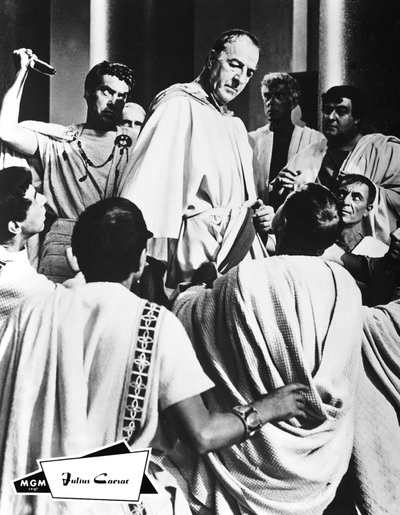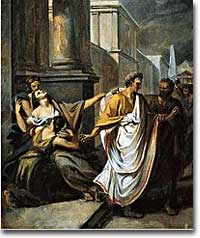

Caesar's reason for the divorce was that "Caesar's wife, like all Caesar's family, must be beyond suspicion". Caesar divorced Pompeia Sulla over this incident without any real proof she had committed adultery with Clodius. Aurelia later appeared as a witness during the trial, along with her daughter Julia, testifying that she had ordered Clodius to leave. Clodius was later charged with the crime of sacrilege by Lucius Lentulus since his trespass caused the interruption of the sacrifice. The two may have had certain improper relations before, but was subdued by Aurelia's close watch upon the women's residence. In 62 BC, during the Bona Dea festival held at Caesar's house, one of Aurelia's maids discovered that Publius Clodius had infiltrated the house while disguising as a woman, in order to start or continue an affair with her second daughter-in-law Pompeia. Caesar subsequently married Pompeia Sulla, granddaughter of Sulla. Aurelia became involved in the petition to save her son, defending him along with her brother Gaius Cotta.Īfter Cornelia's death in childbirth, Aurelia raised her young granddaughter Julia and managed her son's households. Discover the omens in The Tragedy of Julius Caesar, including strange events, the role of the soothsayer, animals, and eerie images, and Caesars ghost. Young Caesar firmly refused, which put himself at great risk from Sulla. When the younger Caesar was about 18, he was ordered by the then dictator of Rome, Lucius Cornelius Sulla, to divorce his young wife Cornelia Cinna, daughter of Lucius Cornelius Cinna who had supported Sulla's archenemy Marius. Her husband, the elder Gaius Caesar, was often away, so the task of raising their son fell mostly on Aurelia's shoulders. Highly intelligent, independent and renowned for her beauty and common sense, Aurelia was held in high regard throughout Rome.Īurelia and her family were very influential in her son's upbringing and security. Plutarch described her as a woman of discretion. The historian Tacitus considered her an ideal Roman matron and thought highly of her, because she offered her children the best opportunities of education.

Three of her brothers were consuls: Gaius Aurelius Cotta in 75 BC, Marcus Aurelius Cotta in 74 BC and Lucius Aurelius Cotta in 65 BC.Īurelia married a praetor Gaius Julius Caesar. Publius Rutilius Rufus was her maternal uncle. Her mother Rutilia, was a member of the gens Rutilia. The family of the Aurelii Cottae was prominent during the Roman Republican era. Her father was consul in 119 BC and her paternal grandfather of the same name was consul in 144 BC. 120 BC – July 31, 54 BC) was the mother of the Roman general and statesman Julius Caesar.Īurelia was a daughter of Rutilia and Lucius Aurelius Cotta or his brother, Marcus Aurelius Cotta. Everyone wanted to seem to have had some part in the murder, and there was not one of them who failed to strike his body as it lay there, until, wounded thirty-five times, he breathed his last.Aurelia ( c. Under the mass of wounds, he fell at the foot of Pompey's statue. They were just like men doing battle against him. Minucius also hit out at Caesar and hit Rubrius in the thigh. While Cassius Longinus was trying to give him another blow he missed and struck Marcus Brutus on the hand. After a moment, Cassius made a slash at his face, and Decimus Brutus pierced him in the side. The latter heard him and drove his sword into the ribs. Caesar rose to defend himself, and in the uproar Casca shouted out in Greek to his brother. He had been aiming for that, but in the excitement he missed. First Servilius Casca struck him with the point of the blade on the left shoulder a little above the collar-bone. All quickly unsheathed their daggers and rushed at him.

That was the moment for the men to set to work.


 0 kommentar(er)
0 kommentar(er)
